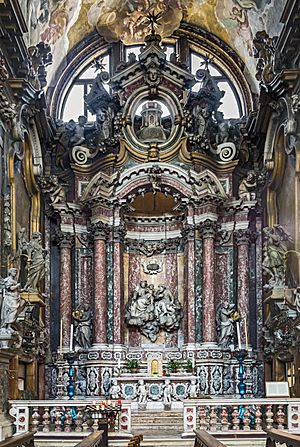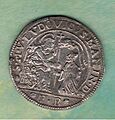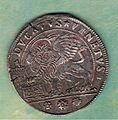Ludovico Manin facts for kids
Quick facts for kids Ludovico Manin |
|
|---|---|
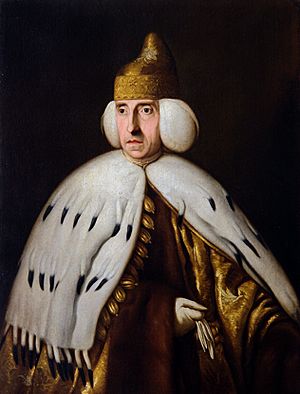
Ludovico Manin, portrait by Bernardino Castelli
|
|
| Doge of Venice | |
| Reign | 10 March 1789 – 12 May 1797 |
| Predecessor | Paolo Renier |
| Successor | Position abolished (Fall of Venice, annexation to the Austrian Empire) |
| Born | Ludovico Giovanni Manin 14 May 1725 Venice, Republic of Venice |
| Died | 24 October 1802 (aged 77) Venice, Habsburg Empire |
| Burial | Church of the Scalzi, Venice, Italy |
| Spouse |
Elisabetta Grimani
(m. 1748; died 1792) |
| Father | Lodovico Alvise Manin |
| Mother | Maria Basadonna |
| Religion | Roman Catholicism |
| Occupation | Merchant |
Ludovico Manin was an important Venetian politician. He was the 120th and last Doge of Venice. A Doge was like a leader or duke of the Venetian Republic. He led Venice from 1789 until 1797. That's when he had to step down because of Napoleon Bonaparte. Ludovico Manin was born on May 14, 1725, and passed away on October 24, 1802.
Contents
About Ludovico Manin
His Early Life
Ludovico Manin was born in Venice on May 14, 1725. He was the oldest of five sons. His father was Lodovico III Alvise. His mother was Lucrezia Maria Basadonna. She was related to a famous cardinal named Pietro Basadonna.
Ludovico went to the University of Bologna. He studied natural law there. When he started working in public life, people noticed him. They saw he was kind, honest, and very wealthy.
In 1748, he married Elisabetta Grimani. She brought a large dowry of 45,000 ducats with her. A ducat was a type of gold coin. Elisabetta had been sick since she was a child. They did not have any children together.
His Career Before Becoming Doge
When he was 26, Ludovico became a captain in Vicenza. This was an important role in the government. Later, he was a captain in Verona and Brescia. In Verona, he helped deal with a big flood in 1757.
In 1764, he became a "procurator de ultra" of Saint Mark's Basilica. This was a high-ranking official position. He was very religious. In 1769, he asked to take a break from his duties. He said it was because of his health and hearing.
In 1787, he was chosen to welcome Pope Pius VI. The Pope was traveling through Venice's lands. The Pope honored Ludovico with a special knighthood.
Ludovico owned a large estate called Villa Manin di Passariano. Since he was the oldest son, he inherited it. Later, his nephew inherited it from him.
Becoming the Last Doge
Ludovico was chosen as the Doge of Venice on March 9, 1789. This happened just before the French Revolution began. He was elected on the very first try. The election group had 41 members.
His coronation was a big event. He had to throw coins to the people of Venice. This cost a lot of money. Most of it came from his own pocket.
By 1792, the Venetian merchant fleet was much smaller. It had only 309 merchant ships left.
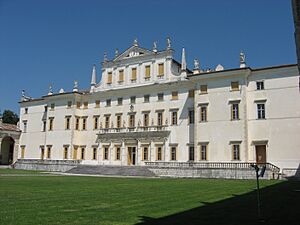
When Napoleon Bonaparte invaded Italy, Venice tried to stay neutral. They did not join other Italian states against Napoleon. But on April 15, 1797, a French general gave the Doge an ultimatum. This was a final demand. Ludovico refused it.
Secretly, a treaty was signed on April 17, 1797. This treaty gave Venice to Austria. On April 25, 1797, the French fleet arrived. Venetian cannons sank one French ship. But Venice's own war fleet was too small to stop them.
The Doge surrendered on May 12, 1797. He left the Doge's Palace two days later. On May 16, French troops entered Piazza San Marco. The surrender was officially signed. Venice was now under French rule.
His Life After Being Doge
After he stepped down, Ludovico did not want to be a leader anymore. He stayed away from public life. He lived in his home, the Palazzo Dolfin Manin. People said he wouldn't even open his door to friends.
He returned the Doge's special crown, called the corno ducale. He also returned the "Golden Book". This book listed the important families of Venice. These items were hidden by the new city leaders.
Ludovico had health problems. He had to walk outside often. Sometimes, former citizens would insult him. They were upset about Venice's changes and his surrender. He wanted to live in a monastery, but he couldn't.
Ludovico died on October 24, 1802. He had problems with his heart. In his will, he asked for a very simple funeral. He left a lot of money, 110,000 ducats, to a foundation. This money was for the benefit of the city's orphans and poor girls needing a dowry.
He was buried in the family tomb. It is in the chapel of the Church of the Scalzi in Venice. His wife was already buried there. His tombstone simply says "Manini Cineres," which means "ashes of Manin."
Images for kids
See also
 In Spanish: Ludovico Manin para niños
In Spanish: Ludovico Manin para niños
 | Chris Smalls |
 | Fred Hampton |
 | Ralph Abernathy |


